鲁教版(五四学制)六年级下册英语Unit 6 Don't eat in class. SectionA 3a-B1d课件+嵌入音频(共23张PPT)
文档属性
| 名称 | 鲁教版(五四学制)六年级下册英语Unit 6 Don't eat in class. SectionA 3a-B1d课件+嵌入音频(共23张PPT) |
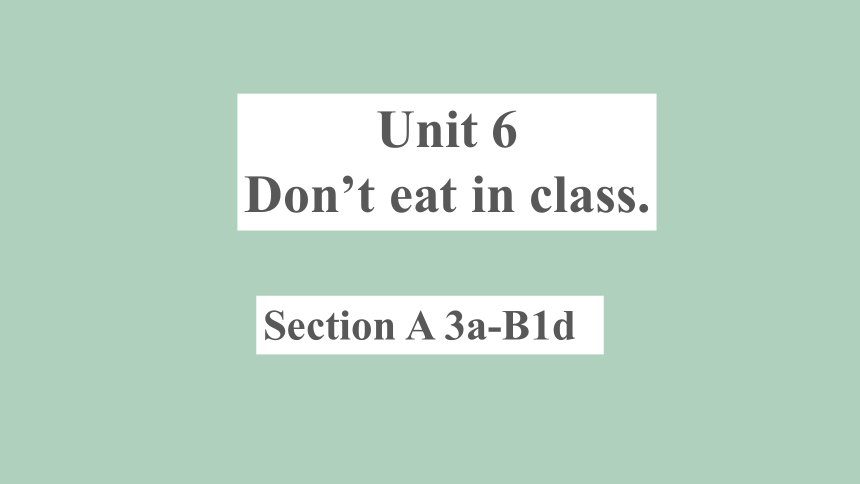
|
|
| 格式 | pptx | ||
| 文件大小 | 3.7MB | ||
| 资源类型 | 教案 | ||
| 版本资源 | 鲁教版 | ||
| 科目 | 英语 | ||
| 更新时间 | 2022-04-02 17:22:30 | ||
图片预览

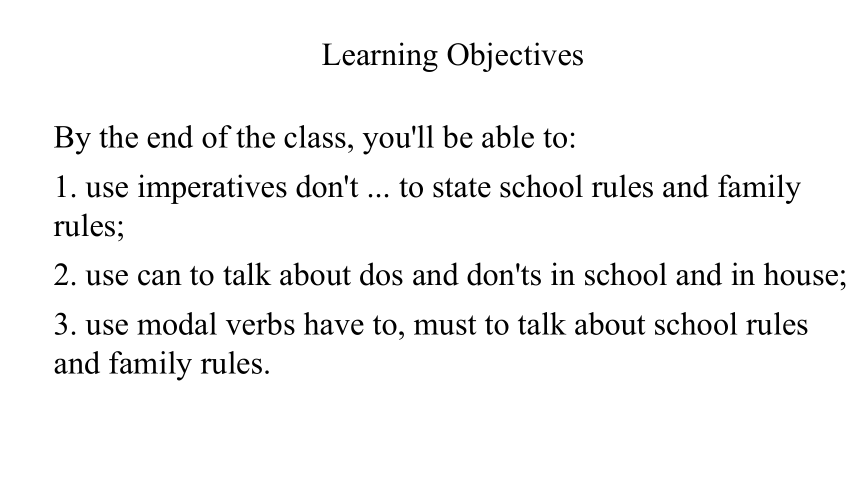
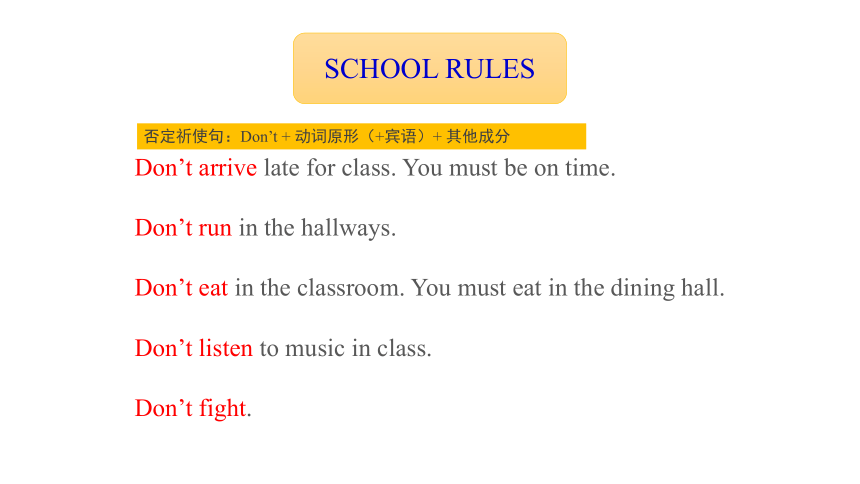
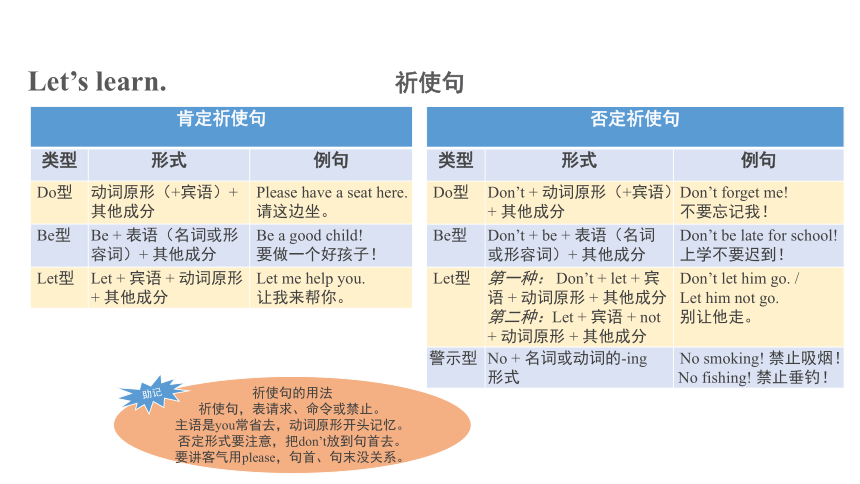
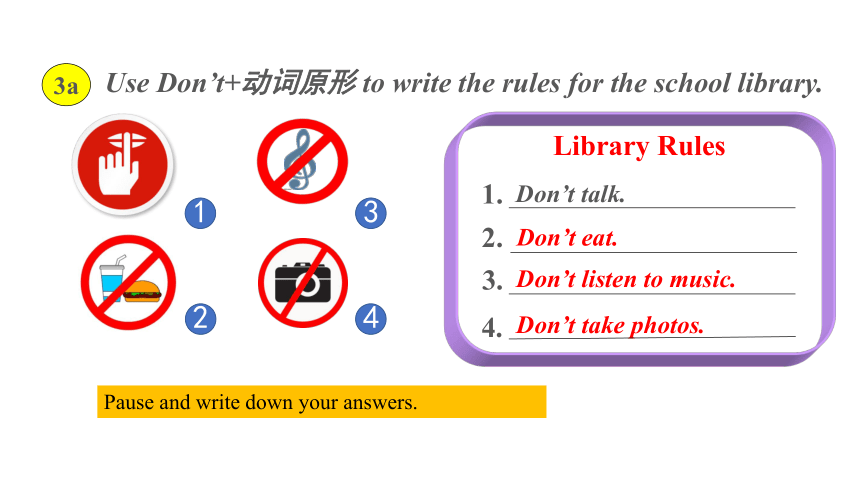
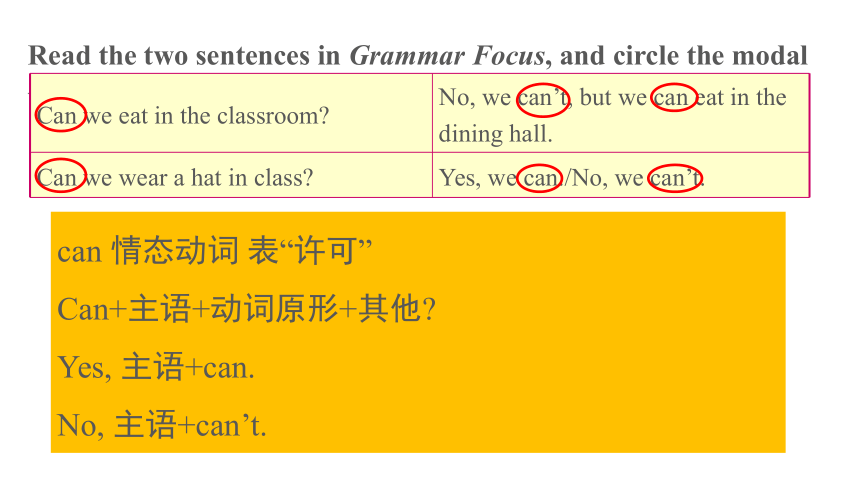
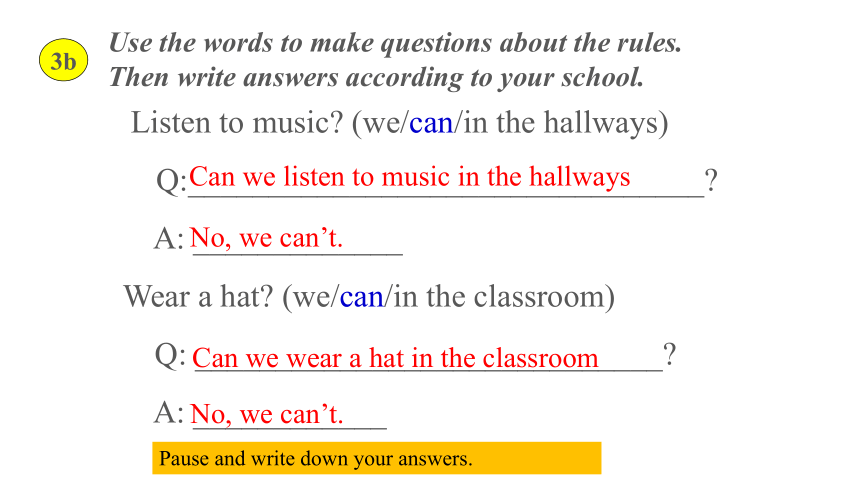
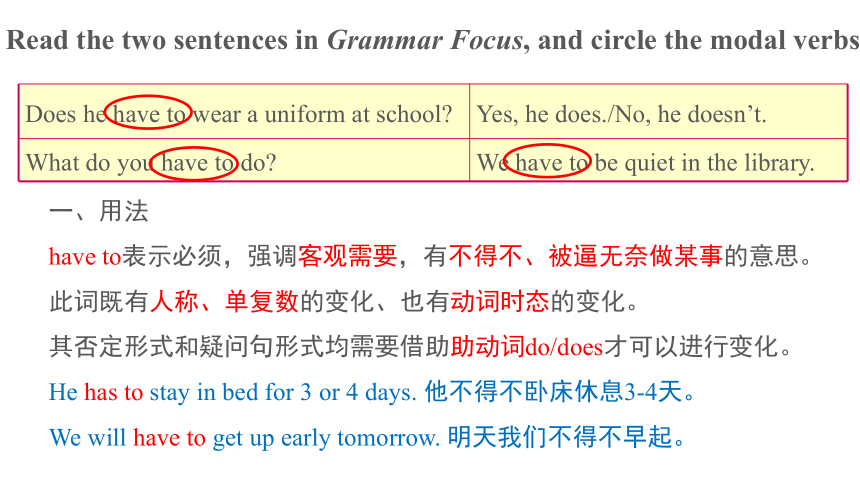
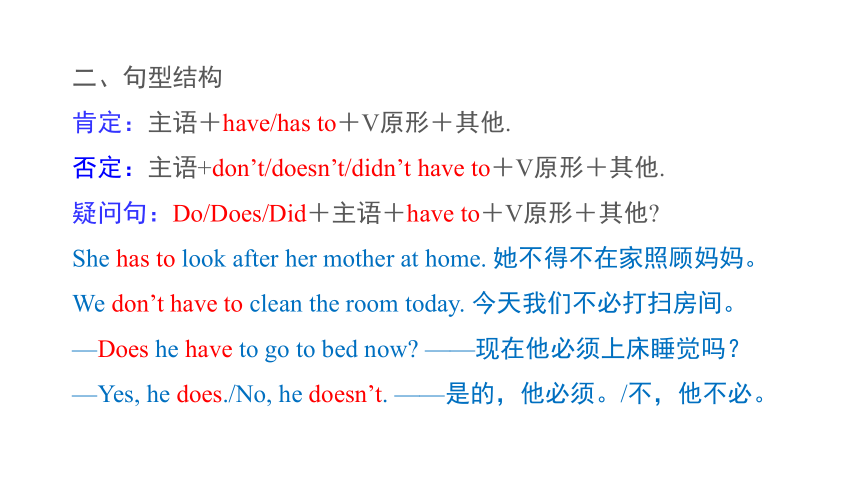
文档简介
(共23张PPT)
Unit 6
Don’t eat in class.
Section A 3a-B1d
Learning Objectives
By the end of the class, you'll be able to:
1. use imperatives don't ... to state school rules and family rules;
2. use can to talk about dos and don'ts in school and in house;
3. use modal verbs have to, must to talk about school rules and family rules.
Don’t arrive late for class. You must be on time.
Don’t run in the hallways.
Don’t eat in the classroom. You must eat in the dining hall.
Don’t listen to music in class.
Don’t fight.
SCHOOL RULES
否定祈使句:Don’t + 动词原形(+宾语)+ 其他成分
肯定祈使句 类型 形式 例句
Do型 动词原形(+宾语)+ 其他成分 Please have a seat here.
请这边坐。
Be型 Be + 表语(名词或形容词)+ 其他成分 Be a good child!
要做一个好孩子!
Let型 Let + 宾语 + 动词原形+ 其他成分 Let me help you.
让我来帮你。
祈使句
否定祈使句 类型 形式 例句
Do型 Don’t + 动词原形(+宾语)+ 其他成分 Don’t forget me!
不要忘记我!
Be型 Don’t + be + 表语(名词或形容词)+ 其他成分 Don’t be late for school!
上学不要迟到!
Let型 第一种: Don’t + let + 宾语 + 动词原形 + 其他成分 第二种:Let + 宾语 + not + 动词原形 + 其他成分 Don’t let him go. /
Let him not go.
别让他走。
警示型 No + 名词或动词的-ing 形式 No smoking! 禁止吸烟!
No fishing! 禁止垂钓!
祈使句的用法
祈使句,表请求、命令或禁止。
主语是you常省去,动词原形开头记忆。
否定形式要注意,把don’t放到句首去。
要讲客气用please,句首、句末没关系。
助记
Let’s learn.
Use Don’t+动词原形 to write the rules for the school library.
Library Rules
1.
2.
3.
4.
Don’t talk.
Don’t eat.
Don’t listen to music.
Don’t take photos.
1
3
2
4
3a
Pause and write down your answers.
Read the two sentences in Grammar Focus, and circle the modal verbs.
Can we eat in the classroom No, we can’t, but we can eat in the dining hall.
Can we wear a hat in class Yes, we can./No, we can’t.
can 情态动词 表“许可”
Can+主语+动词原形+其他
Yes, 主语+can.
No, 主语+can’t.
Listen to music (we/can/in the hallways)
Q:________________________________
A: _____________
Wear a hat (we/can/in the classroom)
Q: _____________________________
A: ____________
Can we listen to music in the hallways
No, we can’t.
Can we wear a hat in the classroom
No, we can’t.
Use the words to make questions about the rules. Then write answers according to your school.
3b
Pause and write down your answers.
一、用法
have to表示必须,强调客观需要,有不得不、被逼无奈做某事的意思。
此词既有人称、单复数的变化、也有动词时态的变化。
其否定形式和疑问句形式均需要借助助动词do/does才可以进行变化。
He has to stay in bed for 3 or 4 days. 他不得不卧床休息3-4天。
We will have to get up early tomorrow. 明天我们不得不早起。
Does he have to wear a uniform at school Yes, he does./No, he doesn’t.
What do you have to do We have to be quiet in the library.
Read the two sentences in Grammar Focus, and circle the modal verbs.
二、句型结构
肯定:主语+have/has to+V原形+其他.
否定:主语+don’t/doesn’t/didn’t have to+V原形+其他.
疑问句:Do/Does/Did+主语+have to+V原形+其他
She has to look after her mother at home. 她不得不在家照顾妈妈。
We don’t have to clean the room today. 今天我们不必打扫房间。
—Does he have to go to bed now ——现在他必须上床睡觉吗?
—Yes, he does./No, he doesn’t. ——是的,他必须。/不,他不必。
1. Be quiet (she/have to/in the library)
Q: Does she have to be quiet in the library
A: Yes, she does.
Use the words to make questions about the rules. Then write answers according to your school.
3b
2. Eat (he/have to/in the dining hall)
Q: ________________________________
A: _____________
Yes, he does.
Does he have to eat in the dining hall
Pause and write down your answers.
辨析:must与have to
含义 用法
must 必须 没有人称和数的变化,强调主观看法。例如:You must finish your homework today.
He must go home now.
have to 不得不 有人称和数的变化,强调客观需要。例如:
She has to go there now.
You have to look after your little brother.
Each family also has its own rules.
Can you tell the rules in your family
FAMILY RULES
I _______ help my mom _______________ every morning.
make breakfast
have to
Look and say
I ______ do my homework ____________.
after school
must
______ watch TV late at night.
Don’t
______ go out ________.
Don’t
at night
rule
go out
practice
dish
do some dishes
before
adv. 规则;规章
外出(娱乐)
v. & n. 练习
n. 碟;盘
清洗餐具
prep. & conj. 在……以前
adv. 以前
Words and expressions
Read the rules in the chart in 1b. Then match the pictures [a-h] with the rules.
___ go out
___ see friends
___ do his homework
___ practice the guitar
___ do the dishes
___ watch TV
___ help his mom make breakfast
___ clean his room
a
h
c
b
e
g
f
d
Rules
help sb. (to) do sth.
help sb. (to) do sth.
帮助某人做某事
Pause and write down your answers.
Rules Can’t (×) Have to/Must (√) When
a go out × on school nights
h see friends
c do his homework
e practice the guitar
b do the dishes
g watch TV
d help his mom make breakfast
f clean his room
Listen and put an × for things Dave can’t do and a √ for things he has to do.
×
×
√
√
√
√
√
1b
Listen again. Write when Dave has to follow the rules in the chart in 1b. Choose from the phrases in the box.
on school nights every Saturday before dinner in the evening
on school days after dinner after school every morning
1c
Rules Can’t (×) Have to/Must (√) When
a go out × on school nights
h see friends
c do his homework
e practice the guitar
b do the dishes
g watch TV
d help his mom make breakfast
f clean his room
×
×
√
√
√
√
√
on school days
after school
before dinner
after dinner
in the evening
every morning
every Saturday
Rules Can’t (×) Have to/Must (√) When
a go out × on school nights
h see friends
c do his homework
e practice the guitar
b do the dishes
g watch TV
d help his mom make breakfast
f clean his room
×
×
√
√
√
√
√
on school days
after school
before dinner
after dinner
in the evening
every morning
every Saturday
Dave can’t go out on school nights
Dave can’t see his friends on school days.
Dave has to do his homework after school.
Dave has to help his mom make breakfast evey moring.
Dave must practice the guitar before dinner.
Dave has to do the dishes after dinner.
Dave can’t watch TV in the evening.
Dave must clean his room every Saturday.
Let’s talk about Dave’s family rules.
Pause and talk to yourself.
— Does Dave have to ...
— Yes, he does.
do the dishes after dinner
Dave has to ...
do the dishes after dinner.
practice the guitar
/ before dinner
√
do the dishes / after dinner
√
Ask and answer.
— Can Dave often ...
— No, he can’t.
He can’t ...
go out on school nights
go out on school nights.
see friends / on school days
×
go out / on school nights
×
We have learnt:
1. how to talk about school rules and family rules by using imperatives.
2. how to talk about school rules and family rules by using
modal verbs can,have to, must.词汇:out, practi/No, he can’t.
Summary
1.You must: Make a list of your family rules.
2. If you can:Preview the letters in 2b of Section B.
Homework
Unit 6
Don’t eat in class.
Section A 3a-B1d
Learning Objectives
By the end of the class, you'll be able to:
1. use imperatives don't ... to state school rules and family rules;
2. use can to talk about dos and don'ts in school and in house;
3. use modal verbs have to, must to talk about school rules and family rules.
Don’t arrive late for class. You must be on time.
Don’t run in the hallways.
Don’t eat in the classroom. You must eat in the dining hall.
Don’t listen to music in class.
Don’t fight.
SCHOOL RULES
否定祈使句:Don’t + 动词原形(+宾语)+ 其他成分
肯定祈使句 类型 形式 例句
Do型 动词原形(+宾语)+ 其他成分 Please have a seat here.
请这边坐。
Be型 Be + 表语(名词或形容词)+ 其他成分 Be a good child!
要做一个好孩子!
Let型 Let + 宾语 + 动词原形+ 其他成分 Let me help you.
让我来帮你。
祈使句
否定祈使句 类型 形式 例句
Do型 Don’t + 动词原形(+宾语)+ 其他成分 Don’t forget me!
不要忘记我!
Be型 Don’t + be + 表语(名词或形容词)+ 其他成分 Don’t be late for school!
上学不要迟到!
Let型 第一种: Don’t + let + 宾语 + 动词原形 + 其他成分 第二种:Let + 宾语 + not + 动词原形 + 其他成分 Don’t let him go. /
Let him not go.
别让他走。
警示型 No + 名词或动词的-ing 形式 No smoking! 禁止吸烟!
No fishing! 禁止垂钓!
祈使句的用法
祈使句,表请求、命令或禁止。
主语是you常省去,动词原形开头记忆。
否定形式要注意,把don’t放到句首去。
要讲客气用please,句首、句末没关系。
助记
Let’s learn.
Use Don’t+动词原形 to write the rules for the school library.
Library Rules
1.
2.
3.
4.
Don’t talk.
Don’t eat.
Don’t listen to music.
Don’t take photos.
1
3
2
4
3a
Pause and write down your answers.
Read the two sentences in Grammar Focus, and circle the modal verbs.
Can we eat in the classroom No, we can’t, but we can eat in the dining hall.
Can we wear a hat in class Yes, we can./No, we can’t.
can 情态动词 表“许可”
Can+主语+动词原形+其他
Yes, 主语+can.
No, 主语+can’t.
Listen to music (we/can/in the hallways)
Q:________________________________
A: _____________
Wear a hat (we/can/in the classroom)
Q: _____________________________
A: ____________
Can we listen to music in the hallways
No, we can’t.
Can we wear a hat in the classroom
No, we can’t.
Use the words to make questions about the rules. Then write answers according to your school.
3b
Pause and write down your answers.
一、用法
have to表示必须,强调客观需要,有不得不、被逼无奈做某事的意思。
此词既有人称、单复数的变化、也有动词时态的变化。
其否定形式和疑问句形式均需要借助助动词do/does才可以进行变化。
He has to stay in bed for 3 or 4 days. 他不得不卧床休息3-4天。
We will have to get up early tomorrow. 明天我们不得不早起。
Does he have to wear a uniform at school Yes, he does./No, he doesn’t.
What do you have to do We have to be quiet in the library.
Read the two sentences in Grammar Focus, and circle the modal verbs.
二、句型结构
肯定:主语+have/has to+V原形+其他.
否定:主语+don’t/doesn’t/didn’t have to+V原形+其他.
疑问句:Do/Does/Did+主语+have to+V原形+其他
She has to look after her mother at home. 她不得不在家照顾妈妈。
We don’t have to clean the room today. 今天我们不必打扫房间。
—Does he have to go to bed now ——现在他必须上床睡觉吗?
—Yes, he does./No, he doesn’t. ——是的,他必须。/不,他不必。
1. Be quiet (she/have to/in the library)
Q: Does she have to be quiet in the library
A: Yes, she does.
Use the words to make questions about the rules. Then write answers according to your school.
3b
2. Eat (he/have to/in the dining hall)
Q: ________________________________
A: _____________
Yes, he does.
Does he have to eat in the dining hall
Pause and write down your answers.
辨析:must与have to
含义 用法
must 必须 没有人称和数的变化,强调主观看法。例如:You must finish your homework today.
He must go home now.
have to 不得不 有人称和数的变化,强调客观需要。例如:
She has to go there now.
You have to look after your little brother.
Each family also has its own rules.
Can you tell the rules in your family
FAMILY RULES
I _______ help my mom _______________ every morning.
make breakfast
have to
Look and say
I ______ do my homework ____________.
after school
must
______ watch TV late at night.
Don’t
______ go out ________.
Don’t
at night
rule
go out
practice
dish
do some dishes
before
adv. 规则;规章
外出(娱乐)
v. & n. 练习
n. 碟;盘
清洗餐具
prep. & conj. 在……以前
adv. 以前
Words and expressions
Read the rules in the chart in 1b. Then match the pictures [a-h] with the rules.
___ go out
___ see friends
___ do his homework
___ practice the guitar
___ do the dishes
___ watch TV
___ help his mom make breakfast
___ clean his room
a
h
c
b
e
g
f
d
Rules
help sb. (to) do sth.
help sb. (to) do sth.
帮助某人做某事
Pause and write down your answers.
Rules Can’t (×) Have to/Must (√) When
a go out × on school nights
h see friends
c do his homework
e practice the guitar
b do the dishes
g watch TV
d help his mom make breakfast
f clean his room
Listen and put an × for things Dave can’t do and a √ for things he has to do.
×
×
√
√
√
√
√
1b
Listen again. Write when Dave has to follow the rules in the chart in 1b. Choose from the phrases in the box.
on school nights every Saturday before dinner in the evening
on school days after dinner after school every morning
1c
Rules Can’t (×) Have to/Must (√) When
a go out × on school nights
h see friends
c do his homework
e practice the guitar
b do the dishes
g watch TV
d help his mom make breakfast
f clean his room
×
×
√
√
√
√
√
on school days
after school
before dinner
after dinner
in the evening
every morning
every Saturday
Rules Can’t (×) Have to/Must (√) When
a go out × on school nights
h see friends
c do his homework
e practice the guitar
b do the dishes
g watch TV
d help his mom make breakfast
f clean his room
×
×
√
√
√
√
√
on school days
after school
before dinner
after dinner
in the evening
every morning
every Saturday
Dave can’t go out on school nights
Dave can’t see his friends on school days.
Dave has to do his homework after school.
Dave has to help his mom make breakfast evey moring.
Dave must practice the guitar before dinner.
Dave has to do the dishes after dinner.
Dave can’t watch TV in the evening.
Dave must clean his room every Saturday.
Let’s talk about Dave’s family rules.
Pause and talk to yourself.
— Does Dave have to ...
— Yes, he does.
do the dishes after dinner
Dave has to ...
do the dishes after dinner.
practice the guitar
/ before dinner
√
do the dishes / after dinner
√
Ask and answer.
— Can Dave often ...
— No, he can’t.
He can’t ...
go out on school nights
go out on school nights.
see friends / on school days
×
go out / on school nights
×
We have learnt:
1. how to talk about school rules and family rules by using imperatives.
2. how to talk about school rules and family rules by using
modal verbs can,have to, must.词汇:out, practi/No, he can’t.
Summary
1.You must: Make a list of your family rules.
2. If you can:Preview the letters in 2b of Section B.
Homework
同课章节目录
- Unit 1 When is your birthday?
- Section A
- Section B
- Unit 2 My favourite subject is science
- Section A
- Section B
- Unit 3 Can you play the guitar?
- Section A
- Section B
- Unit 4 What time do you go to school?
- Section A
- Section B
- Unit 5 How do you get to school?
- Section A
- Section B
- Unit 6 Don't eat in class.
- Section A
- Section B
- Unit 7 Why do you like pandas?
- Section A
- Section B
- Unit 8 I'm watching TV.
- Section A
- Section B
- Unit 9 It's raining!
- Section A
- Section B
- Unit 10 Is there a post office near here?
- Section A
- Section B
